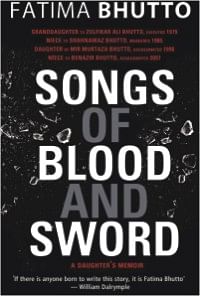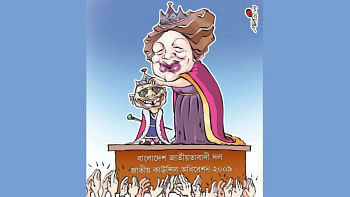Perspectives of a Bhutto

Songs of Blood and Sword
Fatima Bhutto
Viking/Penguin
FATIMA Bhutto has taken great pains in writing this book. She conducted a series of interviews both in and outside Pakistan of the persons who were either related to the Bhutto family in different ways or in the knowledge of affairs as media people. The writing indicates that the author is in quest of searching the glory and merit of her late lamented father Murtaza Bhutto, the first son of ZA Bhutto, former prime minister of Pakistan who was hanged by his protege General Ziaul Haque through the so-called trial held by the army influenced civil court. Throughout the book I have found the agony of Electra for securing justice for her father. The book opens with the chapter where she has narrated the painful incident of the shooting of her father. When she first hears the sound of shots of firearms, she frantically tries to contact her aunt Benazir Bhutto then prime minister of Pakistan. But, according to her, Benazir's oleaginous husband Asif Ali Zardari (presently president of Pakistan) refuses to give in. Finally it is he who confirms that Mortuza has been shot. Can it be thought that the brother of the prime minister can be so openly shot and killed without the blessing of the state? But, of course, this is the legacy of Pakistan.
One may not agree with all of Fatima Bhutto's views but in certain cases she has remained faithful to the history. Before going further I would like to comment about the title of the book. She is the grand daughter of the executed ZA Bhutto. Her father Mir Murtaza Bhutto was shot and killed at a time when her aunt (Murtaza's sister) was prime minister of Pakistan. Her uncle Shahnawaz Bhutto had earlier been mysteriously killed. In 2007, during the election campaign her aunt and former prime minister Benazir Bhutto was assassinated. All these incidents fully justify the title of the book. As a matter of fact, in Pakistan a number of atrocities have claimed a large number of human lives through army action either in Balochistan or in Bangladesh (during 1971). ZA Bhutto was the pioneer of political activities so far as his family was concerned. His political odyssey began in 1958 when he jumped on to the army bandwagon under General Ayub Khan. It was a wrong choice. The Pakistan army along with the Punjabi civil bureaucracy had always intrigued and conspired against political leaders from the very inception of Pakistan. So it was a Faustian agreement for Bhutto when he came under the fold and tutelage of the Pakistan army on order to carry out its political mission. According to Fatima Bhutto, "Mujib wanted the constitution to be framed by his party, allowing him to form the government, while Zulfikar was not comfortable with the army's assurances that the PPP would be given as equal a hand as the Awami League in the proceedings. Effectively, promising power and position to both parties, the army played the two men against each other and ensured that no harmonious settlement was reached." Ultimately the Pak army let loose the reign of terror in the then east Pakistan.
Fatima Bhutto has to a great extent admitted the fact. Let me quote from her book: "The violence of the conflict was staggering. Reports from East Pakistan placed the number of civilian casualties in the millions, citing figures of around 3 million killed. Pakistani officials, via the ludicrous Hamood-ur-Rehman commission --- whose pages were edited by the army and whose full copy no one has yet seen --- insisted the number was closer to some 30,000, a mere by-product of the war. International figures, treading lightly, estimated around 200,000 dead on the Eastern front. While the numbers differ, estimated around 200,000 dead on the Eastern front. While the numbers differ, there is no dispute regarding the sheer force used by the Pakistani Army against civilians, most notably women." Again, "In addition to reports of sanctioned violence towards women, there were charges levelled against the Pakistani Army for its use of violence towards intellectuals, academics and minorities, Hindus specifically. Word had spread to Karachi that the Pakistani Army, having killed 200 intellectuals in Dhaka, was planning to carry out the same kind of massacre in Sindh to quell inconvenient questions of their brutality in the civil war."
On getting this news Bhutto became furious and called General Gul Hasan, corps commander of Sindh, and threatened that in such a situation he would be the second Mujib. This comment of Bhutto is an acknowledgment of the fact that Bangabandhu Sheikh Mujibur Rahman was a brave and undisputed leader of Bangladesh. Fatima Bhutto should get a salute from us as she has challenged the misleading information provided by Sharmila Bose who, in 2005, came to Bangladesh and went back with the tutored knowledge that the incidents of rape in 1971 were negligible. Sharmila Bose is the grand daughter of the great Indian Nationalist leader Subash Chandra Bose. She is also a Harvard educated academic.
Fatima Bhutto has described the touching incident involving a rape victim named Khadija on page 101 of her book. Fatima Bhutto narrates the sufferings of the Baloch, another wretched group in Pakistan. The Baloch people did not want to join Pakistan but their rulers were bribed and they joined Pakistan. Ever since Baluchistan, rich in mineral resources, has been plundered by successive Pakistani rulers. Earlier in Ayub's time the butcher General Tikka Khan carried out a massacre in Baluchistan. General Tikka won a double crown as butcher when he committed genocide in Bangladesh in 1971. In the words of Fatima Bhutto, "In 1972, the Baloch found themselves pushed against the wall once more. They had voted alongside the Awami League and were further isolated when East Pakistan broke away from the union." ZA Bhutto also sent the army at the instigation of the Shah of Iran, who had been apprehending armed attacks from Baluchistan." In the resultant encounter, ten thousand Baloch people were killed. Fatima Bhutto's narrative continues: "The army was sent into Balochistan once more. Zulfikar was not the first premier to take excessive measures against the Baloch, but he shouldn's have acted in conformity with his predecessors, all insecurely prone to excessive violence against the Baloch people." In 1976, after General Tikka Khan retired, Bhutto appointed General Ziaul Haque as the new army chief over the heads of five senior generals. When Bhutto was arrested and General Zia made almost all arrangements to hang him, his sons Murtaza and Shahnawaz moved around the world to save their father's life. As part of this campaign Bhutto's sons met Yasser Arafat, the PLO chief, who assured them that Bhutto's life would be saved. Arafat was confident. Why? This would be clear from Fatima Bhutto's narrative: "He recounted a story of running into General Zia at Mecca while both men were performing the Haji. Arafat told the brothers that 'he asked General Zia in front of the Kaaba to spare Bhutto's life and that the General had promised clemency." Every author is sure to have his/her personal views, philosophy and social and political out look. From this point of view certain comments or remarks of Fatima Bhutto seem to be faithful to history. She is reticent in making her comments about a person or an incident. This book can be treated as a work of research and will be of great use to those who wish to dwell on the political history of Pakistan --- of the present or of bygone days.

 For all latest news, follow The Daily Star's Google News channel.
For all latest news, follow The Daily Star's Google News channel. 



Comments